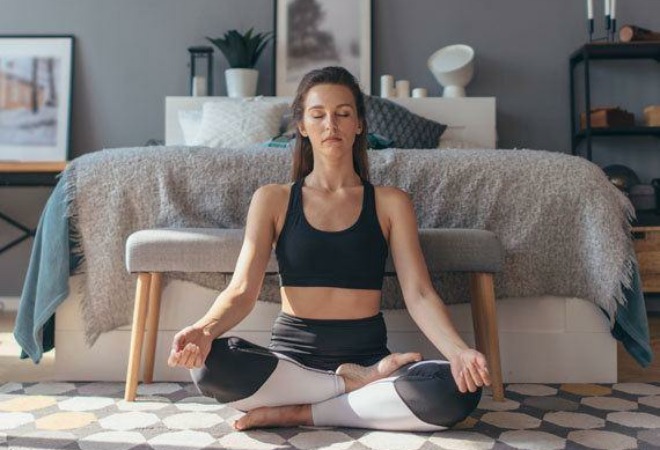Do you struggle to quiet your mind and relax your body when it comes time to sleep? Many of us live busy lives, where we’re constantly on the go and don’t give ourselves a moment to take a step back and breathe. What we don’t realise is that what we do throughout the day can have an impact on how easily we fall asleep. Using relaxation techniques for sleep is an effective way to help put you in a calm state, that will help prepare you for a restful sleep.
While we aren’t always able to switch our thoughts on and off, there are relaxation techniques for sleep, we can use to help relax the mind and improve sleep quality. We spoke with women’s mindset coach and meditation teacher Meegan Care who has drawn on her extensive therapeutic training and more than two decades of clinical and group work, to share her top tips on how to achieve relaxation for sleep.
Relaxation techniques
Preparing your body for restful sleep
A restful night’s sleep is one of the most important foundations for good health. Preparing for sleep, starts well before your head hits the pillow. How you support yourself during the day can lead to either deep restorative or interrupted sleep.
The two different branches of the autonomic nervous system help us to understand what supports or hinders our sleep quality.
- The Sympathetic Nervous System, or ‘fight and flight’ branch of the nervous system is responsible for responding to stress related activities. Think of the Sympathetic Nervous System as the accelerator, speeding you up and getting you moving.
- The Parasympathetic Nervous System allows your body to ‘rest and recover’, maintaining normal restorative functioning. Think of it as the brake, slowing you down and helping you to relax.
The demands of our modern world, mean we use a lot of accelerator and not much brake during our daily lives. So, come bedtime if your system is still revved up and has trouble winding down, it can be harder to get that restful state of sleep. By learning to access the Parasympathetic brake during micro-moments in your day, will give your system an opportunity to pause and unwind stress. This leaves you in a much better position to change gears into relaxation at night. This might include taking mindful moments to pause, for example, you might notice your feet on the ground, or you might take a few deep breaths.
Relaxation techniques
Mindfulness-based relaxation tips
Here are some useful mindfulness-based relaxation tips for sleep that will help support your internal ‘rest and recovery’ system, helping to create restful sleep.
3 – 4 – 5 BREATH PRACTICE
This breath practice is a gentle way to unwind stress during the day and prepare for sleep at night.
- Place one hand on your chest area and one hand on your belly
- Body is soft and relaxed
- Slowly inhale for a count of 3
- Hold for a count of 4
- Slowly exhale for a count of 5; for added stress reduction, exhale gently through pursed lips
Repeat in your own time, for as long as is comfortable. Take a pause between rounds if necessary. To note, it is best to not practice this to the point of feeling breathless.
Helpful tip: this may also be done regularly during the day to unwind stress.
BREATH AWARENESS MEDITATION
I recommend doing this adapted version of the classic Breath Awareness Meditation as you go off to sleep at night. It’s also useful if you wake in the night and are unable to easily go back to sleep.
- Eyes are closed, lying in a comfortable position
- Gently become aware of different parts of your body – noticing feet, then knees, hips, abdomen, chest, shoulders, arms, then hands, back and spine. Notice your physical contact with the bed beneath you, become aware of your neck, head and face. Now become aware of your body in its entirety
- Breath is natural, simply allow the body to breathe in its own rhythm
- Become aware of your body breathing, notice the physical sensation of lungs filling and lungs emptying
- Your job is to notice the breath, and then to notice when the mind has wandered away from observing the breath
- When you notice the mind has wandered or thoughts arise, this is ok, simply return awareness to noticing breath
- Continue bringing awareness to the physical sensations of your body, breathing for as long as you would like, 5-20 minutes, or until you naturally fall asleep if practicing in bed
By engaging this routine regularly, you are giving your system deep rest and an opportunity to open to more restorative sleep. This practice is also helpful as a micro-moment pause, to restore calm and relaxation at any time during the day.
MINDFUL JOURNALING
Journal those worries out. Your brain will sort through the day’s thoughts, worries and to-do lists, as soon as you start to slow down and relax, which is why as you are trying to go off to sleep, suddenly you find your mind going over and over things.
You might find it helpful to get them all out on paper by writing in a journal, before you retire for the evening. Write in a free-flow way, allowing the thoughts and words that are in your head to flow onto the page, unhindered without trying to problem solve. This is a helpful way to untangle the mind and empty your worries at the end of the day.
Relaxation techniques
Sleep hygiene tips
Along with the importance of a comfortable bed, here are some other effective sleep hygiene tips:
- Say no to caffeine after midday; caffeine is known to disrupt your ability to sleep soundly, so if you are struggling with sleep, either cut caffeine out altogether or limit caffeine intake to the morning only
- Reduce blue light at night; turn those screens off an hour before bedtime, or pick up a book instead
- A dark room is more conducive to restful sleep, block out as much light as possible
- Avoid having phones and devices in the bedroom, or switch to airplane mode
Life is full and often busy, this is our reality and sometimes because of this our sleep suffers. Mindfulness is a helpful life tool, that teaches us to be present in each moment as it arises, it also teaches us to slow down inside ourselves during the day. Our system is then better prepared to wind down for relaxation and sleep at the end of the day.




